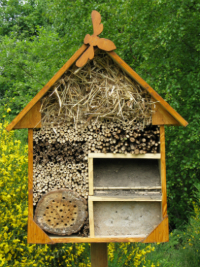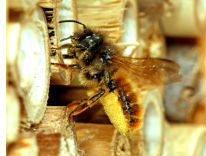Winterbourne House and Garden have hives on site and sell the honey extracted and collected by their very own beekeepers. Birmingham and District Beekeepers Association have a training area at the gardens; an apiary with around a dozen hives.
Fifty seven species of bee are known from the Edgbaston campus, and there are likely to be more. Various steps have been taken to help improve the available habitat for bees.
Bee hotel

This bee hotel at Station Meadow is designed to provide a nesting resource for a wide-range of different species of solitary bee and beneficial solitary wasp, within easy reach of the diverse and abundant wildflowers available.
To support species in differing size and preference, there are a diverse range of hole diameters (3-15mm) in a range of different substrates:
- Concrete
- Wood
- Bamboo
- Dock
- Bramble
Types of bee
Example of bees nesting in this habitat are:
- Red Mason Bee (Osmia bicornis)
- Osmia leaiana (who’s larvae feed only on pollen from types of daisy)
- Blue Mason Bee (Osmia caerulescens)
- Hylaeus communis (a type of white-faced bee)
- Megachile ligniseca (a type of leafcutter bee) all nest in this habitat
These species of bee, and a range of species of solitary wasp, in turn support a range of cuckoo and true parasite species such as ruby-tailed wasps, and Gasteruption jaculator.
Since the bee hotel was installed, the design has been improved with the addition of rotting wood and Oasis to provide an even more diverse range of nesting habitat.
Read more about why Winterbourne Gardens is an oasis for bees and beekeepers